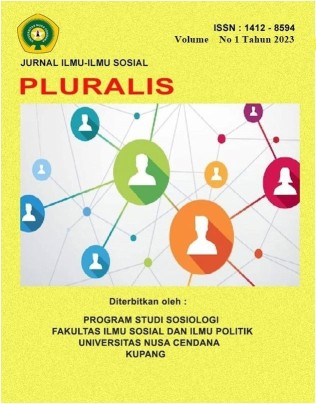NILAI SOSIAL BUDAYA RAGA RANDANG (Studi Sosiologis Pada Masyarakat Desa Wue Kecamatan Wolomeze Kabupaten Ngada)
Abstract
This research is entitled "Socio-Cultural Values of Raga Randang (Sociological Study on the Community of Wue Village, Wolomeze District, Ngada Regency)". The problem in this study is what are the socio-cultural values contained in the traditional ceremony of Raga Randang in Wue Village, Wolomeze District, Ngada Regency? Therefore, we can conclude that the aim of this study is to find or reveal the socio-cultural values contained in the traditional ceremony of Raga Randang in Wue Village, Wolomeze District, Ngada Regency. This research used the theory of action from Talcott Parsons which the method was included was qualitative descriptive with data collection techniques after doing interviews with related respondents and data collection through documentation. Although initially planned to use observation techniques, no traditional ceremonial activities of Raga Randang were found during field research. Therefore, observation techniques could not be implemented in this research. The informants in this study amounted to 5 people consisting of 1 Traditional Chairman (Dor), 1 Community Leader, 1 LPA Chairman and 2 Indigenous Elders, who had an important role and knew about the traditional ceremony of Raga Randang. The results of this study indicate that the tradition of Raga Randang is still being maintained by the community of Wue Village which is a heritage passed down from generation to generation with the aim of picking up guests of honor and giving life to the people of Wue Village such as building roads and other infrastructures. The implementation of the Raga Randang traditional ceremony consists of three stages. The first stage is preparation, which involves a discussion (Reze Nanggur) and the lowering of the gong (Wau Gong). The second stage is the execution, which begins with the hanging of symbolic objects (Keu Kanggong) and traditional prayers (Pintu Manuk). The final stage involves the procession of escorting (Podo) and hanging the gong (Teong Gong). The values contained in the Raga Randang tradition are 1). Mutual cooperation, 2). Religious, 3). Deliberation for consensus, 4). hospitality, 5). Appreciation, and 6). Continuity. The researcher suggests that traditional chairman and indigenous elders provide cultural education to the younger generation, especially about what traditional ceremonial traditions Raga Randang is, so that its meaning and value will not be lost at any time and also for the entire community of Wue Village to jointly guard and maintain the Raga Randang traditional ceremonial tradition as a means of picking up guests of honor.

 Yuni Klotilda Naro(1)
Yuni Klotilda Naro(1)




